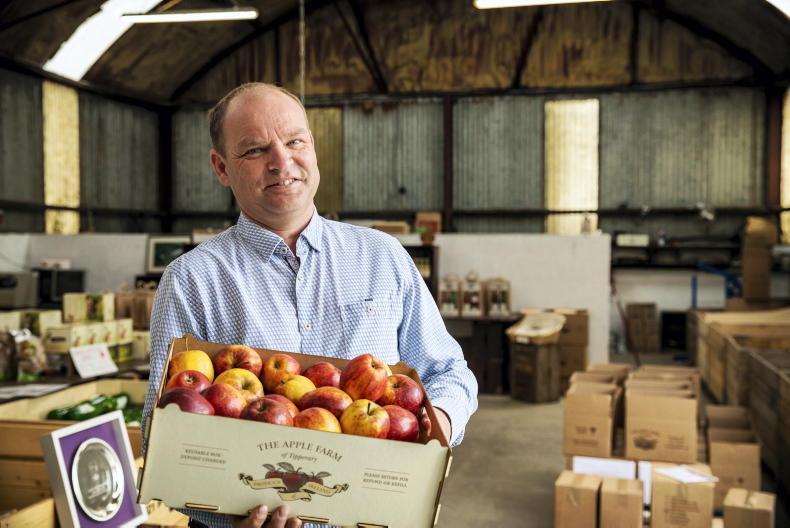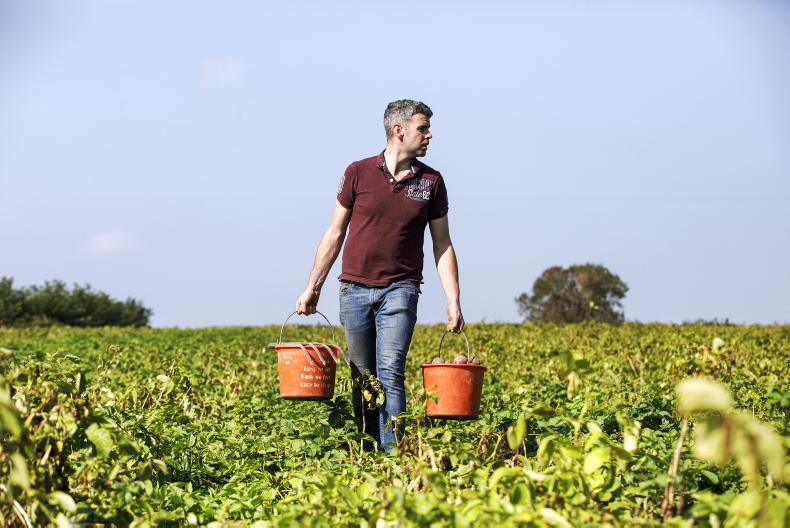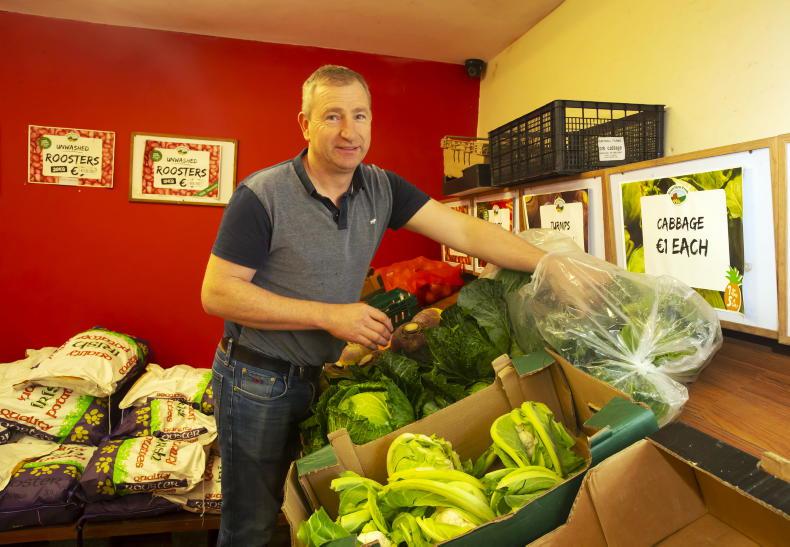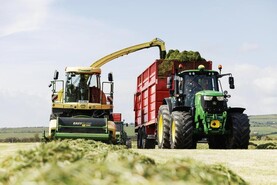Con Traas,
Cahir, Co Tipperary
“We grow apples and plums in Cahir, Co Tipperary. Growth is good but disease control during wet periods can be tricky. The recent rainfall was welcome but we are very wary of hailstorms that have occurred around the country over the last couple of weeks as they can damage the fruit. We’ve noticed a higher incidence of disease this year, especially apple scab.

Con Traas at the Apple Farm, Co Tipperary \ Philip Doyle
“Yields should be good this year. We are hoping for just under 20t/ac. Consumer demand for Irish apples is very good, we sell our plums locally and run our own farm shop selling apple juice. The public has great interest in local produce. Labour is always a concern; I’ve heard of farmers offering up to a 50% increase in wages for the harvest.”
Tom Murray, Piltown, Co Kilkenny
“With the late spring, we started on the back foot. Once growers got crops planted, we went into irrigation straight away with the drought. Irrigation may begin again this week in parts of the country. Irrigation is one of the biggest jobs you’ll do on the farm.
“I’ve heard of hailstorms which damaged cabbage and potato crops in Co Wexford last week. The biggest influencing factor every year is Mother Nature. Horticulture farmers carry a great risk on their shoulders. Yields will be hampered across vegetable and potato production this year.

Agronomist Tom Murray taking samples from a crop of potatoes last year for O'Shea Farms, Piltown. \ Donal O'Leary
“As a sector, sustainability is profitability. Investment in new technology, knowledge transfer and increased efficiency could help farmers – growers can’t go green if they’re in the red.”
Shane Halpin, Lusk, Co Dublin
“I grow cucumbers and I’m involved in Brussels sprout production outside Lusk, Co Dublin. Progress has been steady, good weather has increased the demand for salad vegetables and the warm weather has aided growth rates. We saw great growth in June especially.
“Cucumbers are grown in tunnels so they don’t face the same harsh conditions as other vegetable crops. On the other hand, outdoor vegetable crops are struggling as herbicides went out late or could not be gotten out at all.
“There are issues with early Brussels sprout crops as some crops are too advanced to spray now. Crops sown later struggled with the drought in May but I wouldn’t worry, crops have a long way to go until harvest in September.”
Seán Ryan, Ballywilliam, Co Wexford
“I grow potatoes in Ballywilliam, Co Wexford. Crops are struggling massively still; crops are coming up very uneven. Crops were sown much later than usual and the drought in May didn’t help our cause.
“This year’s yields will definitely be down on last year. We’ve seen rain in June, which was welcome. We need rain to continue, to keep moisture in the ground and to keep crops growing.

Seán Ryan of Ballywilliam, Co Wexford, in his farm shop. \ Patrick Browne
“A recent storm in Wexford two weeks ago did serious damage to the main stems of the potatoes. Of course, with thunderstorms and humid conditions, blight pressure is at an all-time high.”
James Kearns, Enniscorthy,
Co Wexford
“We grow soft fruits in Enniscorthy, Co Wexford. Right now, we’re back to normality; we were struggling to keep on top of the workload for a couple of weeks as the heat caused fruit to ripen quicker than we would have liked.
“A lot of the main crop season is almost finished, fruit will be scarcer in the coming weeks as fruit that was due to ripen around now has already ripened. Prices will remain constant as prices are fixed with buyers at the beginning of the year.
“Fixed prices give us security and ensure that consumers can pay a consistent price for produce.”
Val Farrell, Skerries, Co Dublin
“We grow bedding plants, perennials, roses and hedging in Skerries, Co Dublin. We’ve had a fragmented season in terms of business, with very little activity in March and April due to wet weather.
“We dumped lots of products such as bedding plants in the spring as there was no demand for them. People don’t want to garden during bad weather. On top of that, there was a shortage of plants in May due to the drought. We were very busy in June trying to make up ground.
“The biggest challenge for hardy nursery stock is finding an alternative to peat moss as legislation regarding peat use is continuing to become more restrictive.”
Gerry Reilly,
Athlone, Co Westmeath
“I grow mushrooms in Athlone, Co Westmeath. Mushroom production is an intensive labour production system. Our biggest issue is acquiring sufficient labour.
“The Government needs to reopen the work permit scheme. We need more work permits to have a viable business; the business can’t run without enough hands.
“Needless to say, we are suffering from huge energy costs. Electricity, packaging, compost and all other input costs have risen.
“Consumers also need to realise that large numbers of vegetables are thrown out because they don’t fit consumers’ ideas of perfectly formed vegetables.”
Con Traas,
Cahir, Co Tipperary
“We grow apples and plums in Cahir, Co Tipperary. Growth is good but disease control during wet periods can be tricky. The recent rainfall was welcome but we are very wary of hailstorms that have occurred around the country over the last couple of weeks as they can damage the fruit. We’ve noticed a higher incidence of disease this year, especially apple scab.

Con Traas at the Apple Farm, Co Tipperary \ Philip Doyle
“Yields should be good this year. We are hoping for just under 20t/ac. Consumer demand for Irish apples is very good, we sell our plums locally and run our own farm shop selling apple juice. The public has great interest in local produce. Labour is always a concern; I’ve heard of farmers offering up to a 50% increase in wages for the harvest.”
Tom Murray, Piltown, Co Kilkenny
“With the late spring, we started on the back foot. Once growers got crops planted, we went into irrigation straight away with the drought. Irrigation may begin again this week in parts of the country. Irrigation is one of the biggest jobs you’ll do on the farm.
“I’ve heard of hailstorms which damaged cabbage and potato crops in Co Wexford last week. The biggest influencing factor every year is Mother Nature. Horticulture farmers carry a great risk on their shoulders. Yields will be hampered across vegetable and potato production this year.

Agronomist Tom Murray taking samples from a crop of potatoes last year for O'Shea Farms, Piltown. \ Donal O'Leary
“As a sector, sustainability is profitability. Investment in new technology, knowledge transfer and increased efficiency could help farmers – growers can’t go green if they’re in the red.”
Shane Halpin, Lusk, Co Dublin
“I grow cucumbers and I’m involved in Brussels sprout production outside Lusk, Co Dublin. Progress has been steady, good weather has increased the demand for salad vegetables and the warm weather has aided growth rates. We saw great growth in June especially.
“Cucumbers are grown in tunnels so they don’t face the same harsh conditions as other vegetable crops. On the other hand, outdoor vegetable crops are struggling as herbicides went out late or could not be gotten out at all.
“There are issues with early Brussels sprout crops as some crops are too advanced to spray now. Crops sown later struggled with the drought in May but I wouldn’t worry, crops have a long way to go until harvest in September.”
Seán Ryan, Ballywilliam, Co Wexford
“I grow potatoes in Ballywilliam, Co Wexford. Crops are struggling massively still; crops are coming up very uneven. Crops were sown much later than usual and the drought in May didn’t help our cause.
“This year’s yields will definitely be down on last year. We’ve seen rain in June, which was welcome. We need rain to continue, to keep moisture in the ground and to keep crops growing.

Seán Ryan of Ballywilliam, Co Wexford, in his farm shop. \ Patrick Browne
“A recent storm in Wexford two weeks ago did serious damage to the main stems of the potatoes. Of course, with thunderstorms and humid conditions, blight pressure is at an all-time high.”
James Kearns, Enniscorthy,
Co Wexford
“We grow soft fruits in Enniscorthy, Co Wexford. Right now, we’re back to normality; we were struggling to keep on top of the workload for a couple of weeks as the heat caused fruit to ripen quicker than we would have liked.
“A lot of the main crop season is almost finished, fruit will be scarcer in the coming weeks as fruit that was due to ripen around now has already ripened. Prices will remain constant as prices are fixed with buyers at the beginning of the year.
“Fixed prices give us security and ensure that consumers can pay a consistent price for produce.”
Val Farrell, Skerries, Co Dublin
“We grow bedding plants, perennials, roses and hedging in Skerries, Co Dublin. We’ve had a fragmented season in terms of business, with very little activity in March and April due to wet weather.
“We dumped lots of products such as bedding plants in the spring as there was no demand for them. People don’t want to garden during bad weather. On top of that, there was a shortage of plants in May due to the drought. We were very busy in June trying to make up ground.
“The biggest challenge for hardy nursery stock is finding an alternative to peat moss as legislation regarding peat use is continuing to become more restrictive.”
Gerry Reilly,
Athlone, Co Westmeath
“I grow mushrooms in Athlone, Co Westmeath. Mushroom production is an intensive labour production system. Our biggest issue is acquiring sufficient labour.
“The Government needs to reopen the work permit scheme. We need more work permits to have a viable business; the business can’t run without enough hands.
“Needless to say, we are suffering from huge energy costs. Electricity, packaging, compost and all other input costs have risen.
“Consumers also need to realise that large numbers of vegetables are thrown out because they don’t fit consumers’ ideas of perfectly formed vegetables.”









 This is a subscriber-only article
This is a subscriber-only article










SHARING OPTIONS: